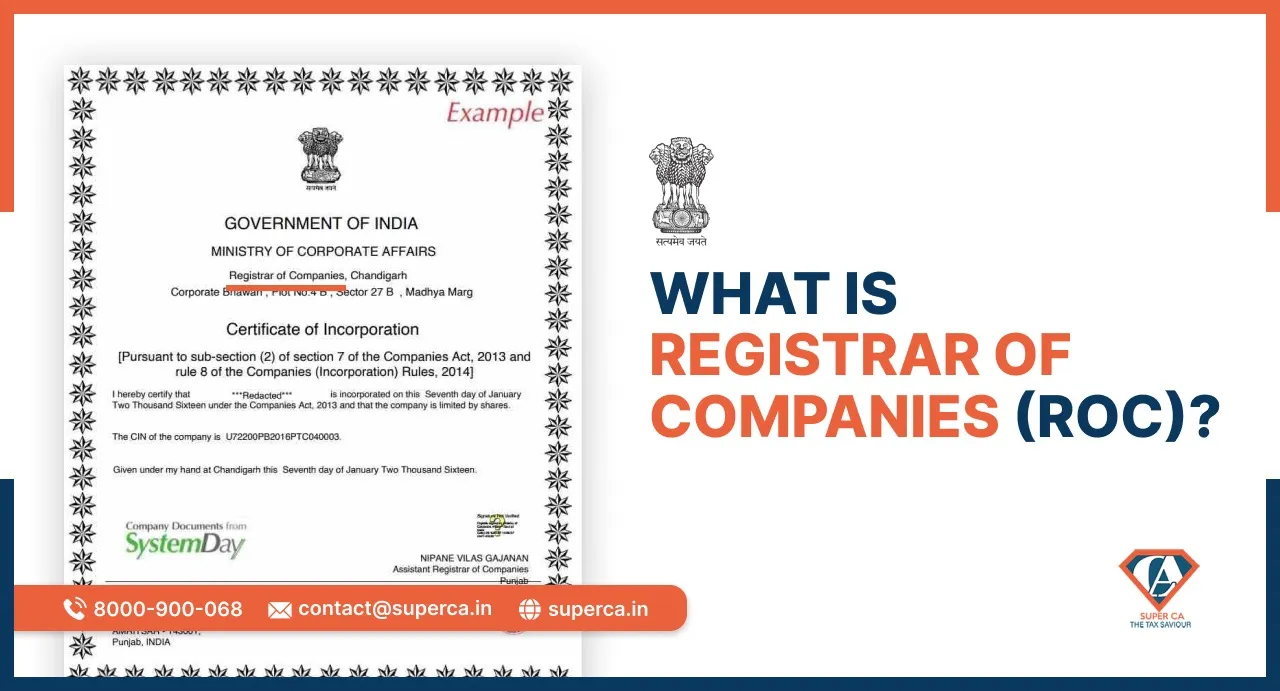What is Registrar of Companies (ROC)?
- Posted By SuperCA
- On 09 July

The Registrar of Companies (ROC) office that deals with administration of companies along with the administration of Limited Liability Partnerships all around the country. The Registrar of Companies (ROC) is an office that has been managed by the Ministry of Corporate Affairs (MCA). As per Section 609 of the Companies Act, Registrar of Companies are equipped by the main duty of registration of both the companies and the Limited Liability Partnerships around all the states and union territories.
A Registrar of Companies is also responsible for certifying the compliance of Limited Liability Partnerships with the legal requirements that are a part of the Companies Act, 2013. The Registrar of Companies is also responsible for maintaining a registry of records of the companies that have been registered with them and also allows the public an access to all the information on the payment of the specified fee. The Registrar of Companies has been controlled by the Central government via the help of Regional Directors.
Functions of the Registrar of Companies(ROC)
The functions of the Registrar of Companies are listed below:
- The registrar of companies is responsible for registering a company in a country.
- The registrar of companies is responsible for regulating and reporting of companies along with their shareholders and directors. It also controls government reporting of certain issues along with the annual filing of different types of documents.
- The Registrar of Companies also plays an important role in fostering and facilitating business culture.
- The registrar of companies also asks for additional information from any of the companies. It is also free to search the premises of business and seize the account books of the company after acquiring an approval from the court.
- The registrar of companies can also file petitions in order to wind up a company.
- Registrar of companies also responsible for providing an Incorporation Certificate. This is necessary because every company has to get approval from the registrar of companies to establish itself, also the incorporation certificate acts as a proof of the existence of the company.
Registration of Companies
It is mandatory for each company to possess an incorporation certificate that has been issued by the registrar of companies after the finalisation of certain statutory requirements. During this procedure, the promoters will have to submit all the required documents to the Registrar of Companies. The required documents are a Memorandum of Association(MoA), an Article of Association(AoA), the agreement of pre-incorporation in order to appoint the managing director and a declaration by an individual who has been authorised confirming the requirements of the registrar of companies.
Once the authentication of all the documents has been completed, the registrar of companies will input the name of the company in the register of companies and will then release the incorporation certificate. The registrar of companies also issues a certificate of commencement of business along with the incorporation certificate. It is also compulsory for a public limited company to acquire the certificate of commencement of business in order to start the business.
Declining the Registration
The registrar of companies also has the liberty to decline a company’s registration on different grounds. The Memorandum of Association (MoA) that consists of five different clauses and is filed with the registrar of companies. The clauses are as follows:
- The name clause
- The objects clause
- The registered office clause
- The capital clause
- The liability clause
The registrar of companies must ensure that a registration with an objectionable name is allowed for any company. The registrar of companies can also decline the registration of a company that has some sort of illegal or unlawful objectives.
Resolution Filing
As per the provisions mentioned in section 117 of the Companies Act, each resolution needs to be filed with the registrar of companies within 30 days of being passed. All these resolutions must be recorded by the registrar of companies. There will be penalties levied under the Company Law if the company fails to file resolutions within the given time with the registrar of companies. Or it can be said that the company has to inform the registrar of companies about all the activities that it performs along with the appointment of managing directors or directors or prospectus issuing or appointment of sole-selling agents or the resolutions related to voluntary winding up, and more.
Conclusion
In this blog, we learnt about the registrar of companies and its functions. We also learnt that the registrar of companies has the power to decline the registration of a company and that the companies have to file resolutions with the registrar of companies within 3 days of passing them.





